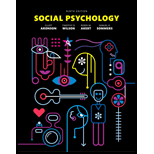
Introduction
Memory is a complex process which psychologists have studied for many years. Despite these studies, we are still not entirely sure how the memory process works. Psychologists do, however, agree that there are three stages to the memory process: acquisition, storage, and retrieval.
Explanation of Solution
Correct answer and explanation
In this case, the correct choice is option (C), Schema. Schema is a thought process which involves the organization and categorization of information. In short, this concept describes the organization of memories. It is a part of Stage Two, Storage, but is not a stage of memory processing and of itself.
Explanations for incorrect options
Option (A) refers to Storage. This is the second of the three stages of processing memories. The question asks us to choose an option NOT part of memory processing. So, option (A) is incorrect.
Option (B) refers to Retrieval. Retrieval is the third of three stages of memory processing. The question asks us to choose an option NOT part of memory processing. So, option (B) is incorrect.
Option (D) refers to Acquisition. The first of three stages of memory processing is acquisition. The question asks us to choose an option NOT part of memory processing. So, option (D) is incorrect.
Therefore, the Options (A), (B), and (D) are incorrect.
Want to see more full solutions like this?
Chapter SPA3 Solutions
Social Psychology (9th Edition)
- Should U.S. foreign policy include provisions for reducing poverty in other nations of the world? Should U.S. domestic policy include provisions for reducing poverty in the United States? How are these issues similar? How are they different?arrow_forwardDiscuss Chapter 1 of Barry Glassner’s “The Culture of Fear.” Student’s may address but are not limited to discussing how the media uses individual scenarios to falsely give a wider perception of some kind, the media’ use of exaggerations and assertions and the financing of fear.arrow_forwardTake something (physical, personal or social) and change it. Tell us, what you started out with, what it looked like after you changed it, and what you did to make the change.arrow_forward
- humanized answers and couple of sentences for each: How did the field of gifted education evolve, and why is it important for giftedness to be recognized as an exceptionality? How do we define “gifts and talents,” and how are students identified? What are some characteristics of students with gifts and talents, and how can the information processing model (IPM) help us understand their needs? Why do students from culturally and linguistically different or socioeconomically disadvantaged homes and twice exceptional student continue to be under-identified for gifted-educational supports and services? What educational responses are needed to address the strengths and challenges of students with gifts and talents? What life course considerations are important for students with gifts and talents?arrow_forwardDescribe the difficulties that individuals may have trying to understand spoken languagearrow_forwardList and describe the ways to understand better how we learn about language and the brainarrow_forward
- 2. How would you compare the lives of poor people living in the low-income nations of the world with those in cities and rural areas of the United States? In what ways are their lives similar? In what ways are they different?arrow_forwarddiscuss the critisism of functionslism theoryarrow_forwardHow have economic crises such as the Great Depression, the 2008–2009 recession, and the COVID-19 pandemic impacted families in both practical and emotional ways? How do these events continue to shape family life today? In what ways has the definition and structure of “family” evolved in the 21st century? How do these changes reflect broader shifts in societal values, gender roles, and legal recognition of diverse relationships? What are some of the major economic and social challenges facing families today, and how do these challenges differ across social class levels, particularly for working-class and middle-class families? How do you think the increasing visibility of same-sex families, domestic partnerships, and cohabitation without marriage will influence societal norms and policies around family in the coming decades? Given current trends, what do you envision family life will look like in the future—by 2030 or 2040? How might factors like technology, economic instability,…arrow_forward
 Social Psychology (10th Edition)SociologyISBN:9780134641287Author:Elliot Aronson, Timothy D. Wilson, Robin M. Akert, Samuel R. SommersPublisher:Pearson College Div
Social Psychology (10th Edition)SociologyISBN:9780134641287Author:Elliot Aronson, Timothy D. Wilson, Robin M. Akert, Samuel R. SommersPublisher:Pearson College Div Introduction to Sociology (Eleventh Edition)SociologyISBN:9780393639407Author:Deborah Carr, Anthony Giddens, Mitchell Duneier, Richard P. AppelbaumPublisher:W. W. Norton & Company
Introduction to Sociology (Eleventh Edition)SociologyISBN:9780393639407Author:Deborah Carr, Anthony Giddens, Mitchell Duneier, Richard P. AppelbaumPublisher:W. W. Norton & Company The Basics of Social Research (MindTap Course Lis...SociologyISBN:9781305503076Author:Earl R. BabbiePublisher:Cengage Learning
The Basics of Social Research (MindTap Course Lis...SociologyISBN:9781305503076Author:Earl R. BabbiePublisher:Cengage Learning Criminalistics: An Introduction to Forensic Scien...SociologyISBN:9780134477596Author:Saferstein, RichardPublisher:PEARSON
Criminalistics: An Introduction to Forensic Scien...SociologyISBN:9780134477596Author:Saferstein, RichardPublisher:PEARSON Sociology: A Down-to-Earth Approach (13th Edition)SociologyISBN:9780134205571Author:James M. HenslinPublisher:PEARSON
Sociology: A Down-to-Earth Approach (13th Edition)SociologyISBN:9780134205571Author:James M. HenslinPublisher:PEARSON Society: The Basics (14th Edition)SociologyISBN:9780134206325Author:John J. MacionisPublisher:PEARSON
Society: The Basics (14th Edition)SociologyISBN:9780134206325Author:John J. MacionisPublisher:PEARSON





